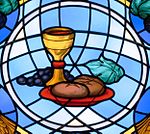This article includes a list of general references, but it lacks sufficient corresponding inline citations. (December 2009) |

| Part of a series on the |
| Eucharist |
|---|
 |
During the Liturgy of the Eucharist, the second part of the Mass, the elements of bread and wine are considered to have been changed into the veritable Body and Blood of Jesus Christ. The manner in which this occurs is referred to by the term transubstantiation, a theory of St. Thomas Aquinas, in the Roman Catholic Church. Members of the Orthodox, Anglican, and Lutheran communions also believe that Jesus Christ is really and truly present in the bread and wine, but they believe that the way in which this occurs must forever remain a sacred mystery. In many Christian churches, some portion of the consecrated elements is set aside and reserved after the reception of Communion and referred to as the reserved sacrament. The reserved sacrament is usually stored in a tabernacle, a locked cabinet made of precious materials and usually located on, above, or near the high altar. In Western Christianity usually only the Host, from Latin: hostia, meaning "victim" (the consecrated bread), is reserved, except where wine might be kept for the sick who cannot consume a host.
The reasons for the reservation of the sacrament vary by tradition, but until around 1000 AD the only reason for reserving the sacrament was to be taken to the ill, homebound, or dying (viaticum). After that devotional practices arose, as for Eucharistic adoration and for Communion services when a priest is unavailable to celebrate the Eucharist. During the Paschal Triduum, the sacrament is taken in procession from the tabernacle, if on the high altar or otherwise in the sanctuary, to the Altar of Repose, and reserved from the end of the Mass of the Lord's Supper until the Communion Rite on Good Friday (called the Mass of the Presanctified, since the Eucharistic Prayer and consecration are omitted in the Good Friday celebration); this period is seen by some as symbolic of the time between the Last Supper and the Crucifixion of Jesus. The Blessed Sacrament is then absent from the tabernacle until the end of the Easter Vigil.
© MMXXIII Rich X Search. We shall prevail. All rights reserved. Rich X Search
